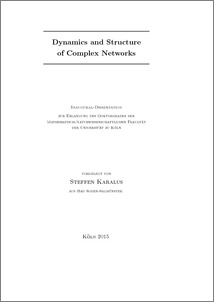Karalus, Steffen
(2015).
Dynamics and Structure of Complex Networks.
PhD thesis, Universität zu Köln.

![[img]](https://kups.ub.uni-koeln.de/style/images/fileicons/application_pdf.png)  Preview |
|
PDF
dissertation_karalus.pdf
- Published Version
Download (4MB)
|
Abstract
In this thesis the relationship between the structure of complex networks and the behavior of dynamical processes on these networks is studied by network evolution. Adopting ideas from biological evolution or Monte Carlo simulations the method of network evolution is developed as strategy to generate networks with a prescribed dynamical behavior without any prior knowledge about the structure-dynamics relation. Here, Laplacian dynamics are considered forming a basic - simple but highly relevant - class of dynamics. Networks are successfully evolved towards a power-law scaling in the spectrum of the graph Laplacian which defines the spectral dimension as important characteristic of diffusion behavior. The resulting evolved networks exhibit heterogeneous structures with densely connected cores and sparse peripheries. The influence of the degree distribution and degree correlations on the spectral behavior is investigated. To this end random networks with the degree distribution and degree correlations of the evolved networks are generated and the Laplacian spectra are compared. Finally, homogeneous networks with the prescribed power law in the Laplacian spectrum are generated by restricting the evolution to regular networks. The resulting evolved networks are found to be highly symmetric. The symmetry is exploited to construct quotient networks as systematic coarse-graining separating the Laplacian spectra into contributions from the repeating symmetric motifs on small scales and the underlying large-scale structures, which are particularly relevant in determining the spectral dimension.
| Item Type: |
Thesis
(PhD thesis)
|
| Translated title: |
| Title | Language |
|---|
| Dynamik und Struktur von komplexen Netzwerken | German |
|
| Translated abstract: |
| Abstract | Language |
|---|
| Diese Arbeit untersucht die Beziehung zwischen strukturellen Eigenschaften und dem Verhalten von dynamischen Prozessen in komplexen Netzwerken. Aufbauend auf Ideen aus der biologischen Evolution oder Monte Carlo-Simulationen wird die Methode der Netzwerkevolution entwickelt. Sie dient zur Generierung von Netzwerken mit vorgegebenem dynamischen Verhalten ohne explizite Vorkenntnis, wie strukturelle Eigenschaften die Dynamik beeinflussen. Insbesondere werden Laplace-Dynamiken als Klasse von grundlegenden - einfachen jedoch hochgradig relevanten - Prozessen betrachtet. Ziel der Evolution ist ein Potenzgesetz im Spektrum der Laplace-Matrix, das die spektrale Dimension als charakteristische Größe für die Beschreibung von Diffusionsprozessen definiert. Die erfolgreich evolvierten Netzwerke weisen heterogene Strukturen, bestehend aus dicht verbundenen Kernen und dünnen Randbereichen, auf. Durch Rekonstruktion der evolvierten Netzwerke wird der Einfluss von Gradverteilung und Grad-Korrelationen auf die spektralen Eigenschaften untersucht. Hierfür werden Zufallsnetzwerke mit der Gradverteilung und den Grad-Korrelationen der evolvierten Netzwerke generiert und die Laplace-Spektren verglichen. Schließlich werden homogene Netzwerke mit dem vorgegebenen Potenzgesetz im Laplace-Spektrum durch Beschränkung der Evolution auf reguläre Netzwerke erzeugt. Die so evolvierten Netzwerke sind gekennzeichnet durch gehäuft auftretende symmetrische Motive. Dies wird für ein systematisches Coarse-Graining der Netzwerkstrukturen genutzt. Dadurch lassen sich die Laplace-Spektren eindeutig in Beiträge der symmetrischen Motive einerseits und der unterliegenden großskaligen Strukturen andererseits aufspalten. | German |
|
| Creators: |
| Creators | Email | ORCID | ORCID Put Code |
|---|
| Karalus, Steffen | karalus@thp.uni-koeln.de | UNSPECIFIED | UNSPECIFIED |
|
| URN: |
urn:nbn:de:hbz:38-64364 |
| Date: |
2015 |
| Language: |
English |
| Faculty: |
Faculty of Mathematics and Natural Sciences |
| Divisions: |
Faculty of Mathematics and Natural Sciences > Department of Physics > Institute for Theoretical Physics |
| Subjects: |
Physics |
| Uncontrolled Keywords: |
| Keywords | Language |
|---|
| statistical physics, complex networks, evolutionary optimization, Monte Carlo optimization, graph Laplacian, Laplacian spectrum, network symmetry | English |
|
| Date of oral exam: |
22 October 2015 |
| Referee: |
| Name | Academic Title |
|---|
| Krug, Joachim | Prof. Dr. | | Berg, Johannes | Prof. Dr. |
|
| Refereed: |
Yes |
| URI: |
http://kups.ub.uni-koeln.de/id/eprint/6436 |
Downloads per month over past year
Export
Actions (login required)
 |
View Item |


